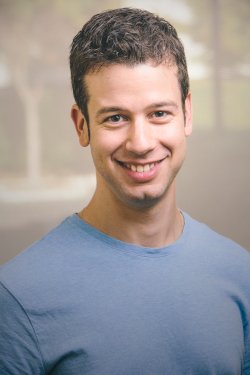Guy Rothblum
2020 Israel Award Winner — Faculty

Current Position:
Associate Professor, Department of Computer Science and Applied Mathematics
Institution:
Weizmann Institute of Science
Discipline:
Computer Science

Current Position:
Associate Professor, Department of Computer Science and Applied Mathematics
Institution:
Weizmann Institute of Science
Discipline:
Computer Science
Recognized for: His theory that enables one to efficiently verify the results of sensitive computations outsourced on untrusted remote computers, and his algorithm that protects individual privacy in statistical analysis and machine learning.
Areas of Research Interest and Expertise: Cryptography, Verifiable Computation, Differential Privacy, Algorithmic Fairness, Complexity Theory
Previous Positions:
BA, The Open University of Israel
MSc, Weizmann Institute of Science (Advisor: Prof. Moni Naor)
PhD, Massachusetts Institute of Technology, USA (Advisor: Prof. Shafi Goldwasser)
Postdoctoral Research Fellow, Princeton University, USA (Advisor: Prof. Boaz Barak)
Researcher, Microsoft Research Silicon Valley, USA
Researcher, Samsung Research America, USA
Research Summary:
Guy Rothblum, PhD, utilizes powerful tools from theoretical computer science to address information security and privacy, which have become important societal concerns with the deployment of cloud computing and data science. His work has not only advanced our understanding of the fundamental limitations of these modern computing methodologies, but also influenced the development of new algorithms and protocols in these fields.
One of his major focuses is verifiable computation, which allows a client with weak computing resources to efficiently verify the results of complex, sensitive computations that are offloaded to a more powerful but untrusted, remote server. Earlier in his career, Rothblum, with collaborators, published a landmark paper on this topic. They built on a concept called “interactive proof” from theoretical computer science, and turned it into a viable tool to check the correctness of outsourced computations, with relatively low computation and communication cost for both the client and the server. This work has found many potential applications in database management, secure hardware design, and even digital currency encryption. Later he further proofed that, for a vast class of computations, the number of client-server interactions required in the verification process could be significantly reduced to a constant value, which is almost the best achievable result for such problems.
The second challenge Rothblum addresses is differential privacy, which aims at protecting the private information of individuals that might leak out through statistical analysis on sensitive datasets. In 2010, Rothblum developed the “private multiplicative weights mechanism”, which has remained the state-of-the-art algorithm for differential privacy when dealing with large numbers of statistical queries. Very recently, Rothblum has even applied the principles of differential privacy to quantum computing, yielding a protocol that better protects the quantum system during information processing.
"Can we harness the power of modern computing without compromising individuals’ privacy or control over their data and computations? It’s a privilege to work on such fascinating questions, and a great honor to be recognized by this Award."
Key Publications:
M. Hardt, G.N. Rothblum. A Multiplicative Weights Mechanism for Privacy-Preserving Data Analysis. IEEE Symposium on Foundations of Computer Science (FOCS), 2010.
O. Reingold, G.N. Rothblum, R.D. Rothblum. Constant-Round Interactive Proofs for Delegating Computation. ACM Symposium on Theory of Computing (STOC), 2016.
G.N. Rothblum, G. Yona. Probably Approximately Metric-Fair Learning. International Conference on Machine Learning (ICML), 2018.
S. Aaronson, G.N. Rothblum. Gentle Measurement of Quantum States and Differential Privacy. ACM Symposium on Theory of Computing (STOC), 2019.
Other Honors:
| 2019 | Amazon Research Award, Amazon |
| 2018 | Morris L. Levinson Prize in Mathematics, Weizmann Institute of Science |
In the Media:
Wired – Cryptography Breakthrough Could Make Software Unhackable